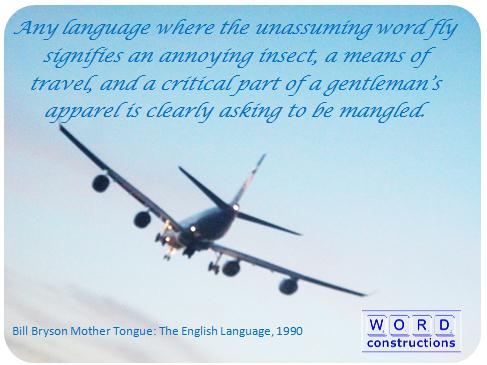I hope you find my writing and business tips and observations useful. My business and blog are dedicated to helping businesses communicate clearly and reach their potential.
Read, subscribe to my newsletter, enjoy!Tash
Production English
Last night I heard of production English for the first time and am quite fascinated with it.
New country, new language
When many people arrive in Australia, they learn English to be able to communicate with other people who live here. English classes teach them things like ‘hello, how are you?’, ‘can I please buy…?’ and ‘where is the library?’
And there’s nothing wrong with that.
I assume the same thing happens for most people who move to a country with a language different to their own.

How would you interpret this situation if you couldn’t read much English? Safety can be jeopardised if people can’t read or understand notices.
What about less generic language?
The challenge really starts when people need more specific language – the words and phrases you don’t get in beginner classes.
For instance, trying to follow a procedure or read instructions on machinery can be quite difficult if you only have basic English.
Especially once you consider grammar and similar words (that is, homonyms and other potentially confusing words that I define in Monday Meanings) can make it even harder to understand – just like pilots can have trouble if English is not their native tongue.
The story I heard last night was about a group of people who work well at their jobs but are sometimes limited or put at risk by the fact that they don’t have ‘production English’ to help them at work.
Obviously, ensuring that procedures and instructions are written as simply and clearly as possible is one aspect – and still a very important task.
Yet it is also critical to help such people learn relevant words in English. And there are programs in Melbourne now that are working on solving this issue, at least for some groups of immigrants.
Does your business have procedures or instructions that would be challenging for someone with only basic English?
* Image courtesy of 123RF
mind your language and fly!
‘Communication is a causal factor in approximately 75 per cent of aviation accidents/incidents’ Russell Eastaway, an Air traffic Control training specialist in Melbourne.
I found that scary – every time we fly, we are relying a lot on the communications skills of pilots and ATCs (air traffic controllers).
It is reassuring in that we can teach communications to the relevant people but an article in Flight Safety Australia explains the bigger issue is probably adjusting their environment to improve aviation communications.
High reliability communication needed
Of the various errors that can occur in aviation conversations, three specifically relate to English (officially the language used in aviation).
Namely, ambiguity, transposition and phonetic similarity can cause major problems.
Did you know there an estimated 100,000 homonyms in English? Homonyms are words or phrases that sound alike but have very different meanings, such as there/their/they’re and your/you’re/yore.
100,000 opportunities to give a meaning you didn’t intend.
In business writing, we can look unprofessional or ignorant to use the wrong word. In aviation, we can say the wrong word and result in a major crash.
Although the consequences may not be as dire when writing, just an awareness of how easy it can be to make mistakes in English can remind us to proof read and get help with our communications. And take the time to learn how to spell various homonyms.
People working in aviation are given training in English and former Emirates head of human factors, Surendra Ratwatte, adds that such training should be given to native-English speakers as well. English speakers need to avoid slang and vernacular use of words to communicate clearly, especially with people less familiar with English and local expressions.
Again, business writers can learn from this by avoiding terms and phrases that may not be recognised by the entire audience.
The point is not the words or language used but that the message is understood as intended.
Do you think your writing could be good enough for people to risk their life on the message getting across clearly?
Work like ours…
How would you react to a website like this?
“we treat the floor and work like ours. We are trying to keep it in cheapest price. If you online quotation we give you 5% discount.”
As key phrases about their benefits on the homepage of a website, the above statements really need some work.
What’s worse is the page title for their homepage includes ‘ploors’ instead of floors.
We came across this site as potential customers, and to be honest we’re reluctant to even get a quote after seeing such errors (trust me, there are many , many more with the site!) They are local and we’d prefer to use a local small business so it just proved to me again how big an impact bad writing can have on your business.
In this case, I suspect English is not their first language and I understand it isn’t an easy second language. At the end of the day, though, do they want people to accept their limitations in English or do they want more customers via an attractive website?
If you struggle with written English (because it is not your first language or any other reason), it really is worthwhile getting someone else to check your writing and edit it for you. An English speaking friend may not get it perfect, but will probably do better than the website I mentioned above. Then get some professional help as soon as you can afford it – even if you have to do it in stages.
Oh, the above sentences would be much more effective as “We treat your floors like our own. We keep our prices as cheap as possible. Get an online quotation for a 5% discount!”
So would you try this business based on their website, or would you go elsewhere?
Have you recently resent that?
Sometimes, I really wonder how people learn English as a second language – it can be so tricky! For instance, the letters s and c can sound exactly the same but using the wrong one can totally change the meaning of a word, such as in recent and resent.
Recent: of a similar time to the present – not long ago or far into the future.
The recent rains have helped our water supply.
Resent: to send something again.
I resent the email after he said he hadn’t received it the first time.
If English isn’t your first language, do you find learning such words difficult?


Recent Comments